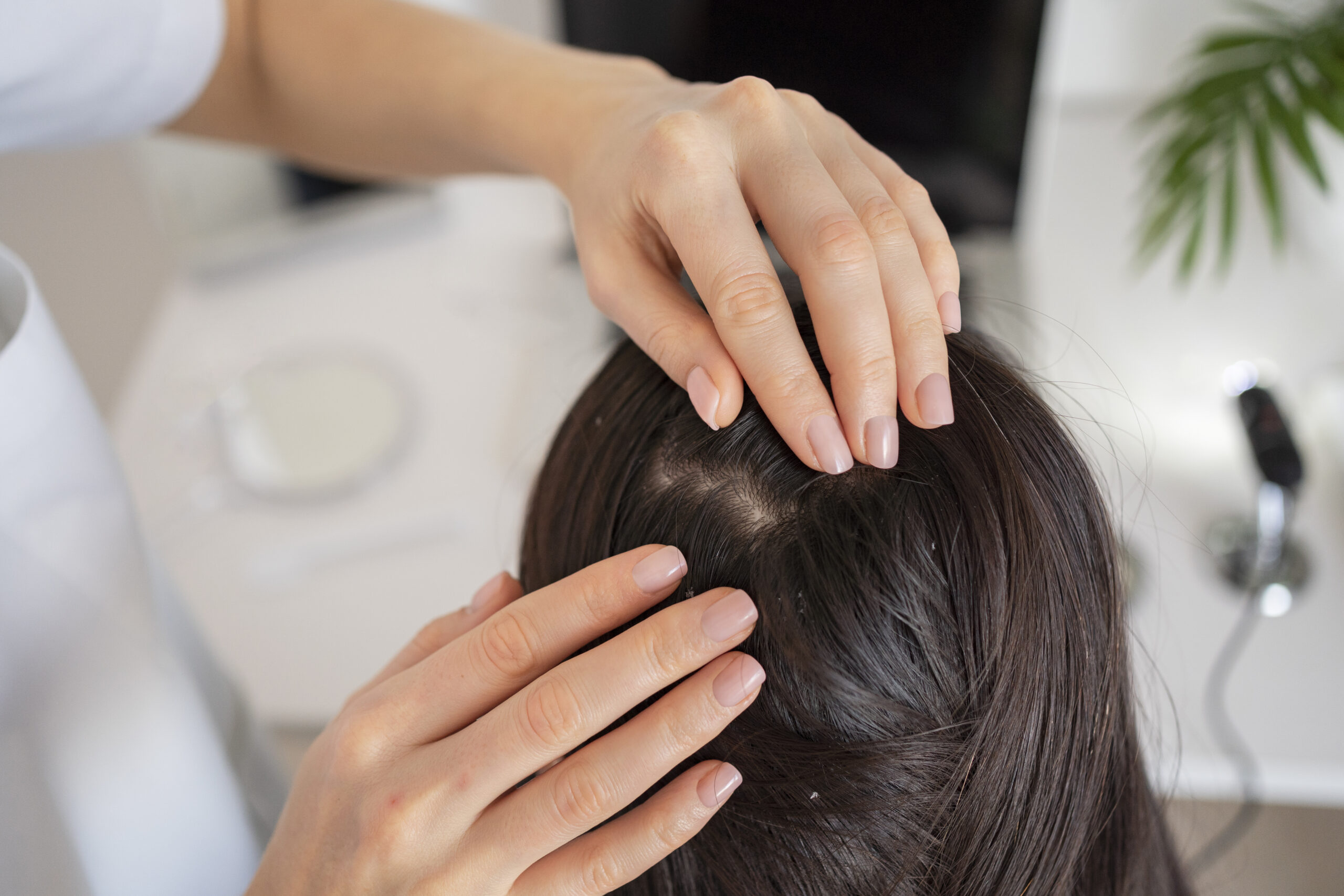It’s common to confuse scalp issues, especially when flakes, itching, or redness appear. The most frequent confusion comes down to dandruff vs psoriasis. At first glance, they may look similar, but they are two very different conditions that require different treatments. Misidentifying one as the other can make symptoms worse.
In this blog, we’ll break down dandruff vs psoriasis by looking at causes, symptoms, risk factors, and treatment approaches so you can better understand what’s happening on your scalp.
What is Dandruff?
Dandruff is one of the most common scalp concerns, affecting people of all ages. It occurs when the scalp sheds an excessive number of dead skin cells, leading to visible flakes.
The exact cause of dandruff is multifactorial, but it is often linked to the overgrowth of a naturally occurring yeast called Malassezia, excess oil (sebum) production, hormonal fluctuations, stress, and sensitivity to certain hair products.
The flakes caused by dandruff are usually white or yellowish, loose in texture, and often fall easily onto your shoulders, making them noticeable. Alongside flaking, some people also experience mild itching, irritation, or greasy patches on the scalp.
When comparing dandruff vs psoriasis, dandruff is generally the milder condition. Unlike psoriasis, dandruff rarely causes thick plaques or intense inflammation. Instead, it is considered more of a chronic but manageable scalp condition. While not harmful to overall health, dandruff can be persistent and socially embarrassing, as the flakes are visible on clothing and hair.
The good news is that dandruff usually responds well to over-the-counter medicated shampoos containing active ingredients like zinc pyrithione, selenium sulfide, ketoconazole, or salicylic acid. Maintaining good scalp hygiene, reducing stress, and avoiding harsh hair products also play a key role in managing dandruff.
So, when it comes to dandruff vs psoriasis, dandruff is not dangerous or immune-related, but it can still affect your confidence and comfort if left untreated.
What is Psoriasis on the Scalp?
Scalp psoriasis, on the other hand, is a chronic autoimmune condition where the immune system mistakenly speeds up the skin cell cycle. Normally, skin cells take about a month to renew, but in psoriasis, this process happens within a few days. As a result, new skin cells pile up on the surface without shedding naturally, forming thick, scaly plaques.

On the scalp, psoriasis appears as raised, inflamed, reddish patches covered with silvery-white scales. Unlike dandruff flakes, these scales are thicker, tightly attached, and may extend beyond the hairline to areas such as the forehead, back of the neck, or behind the ears. Psoriasis can also cause itching, burning, soreness, and, in severe cases, temporary hair loss due to inflammation.
When thinking about dandruff vs psoriasis, psoriasis is far more severe and long-lasting. While dandruff is often triggered by yeast overgrowth or oil imbalance, psoriasis is rooted in immune system dysfunction and genetic predisposition. This makes psoriasis not just a cosmetic issue but a medical condition that often requires ongoing management.
Treatments for scalp psoriasis usually involve prescription-strength topical corticosteroids, vitamin D analogs, coal tar preparations, or newer biologic therapies in more resistant cases. Because psoriasis is systemic, it can also affect other parts of the body, such as elbows, knees, and nails.
In short, dandruff vs psoriasis boils down to intensity and origin: dandruff is a scalp-shedding issue that is mostly manageable, while psoriasis is a chronic autoimmune disease requiring long-term medical care.
ALSO READ
What is Psoriasis – Symptoms, Types, And Latest Treatments in 2025
Dandruff vs Psoriasis: Key Differences
When it comes to scalp conditions, many people get confused between dandruff vs psoriasis, but these two are very different in their appearance, symptoms, and underlying causes. Understanding these differences is important for choosing the right treatment and avoiding unnecessary frustration.
Appearance
Appearance is often the first sign that helps in identifying whether you’re dealing with dandruff or psoriasis. Dandruff usually shows up as fine, white, or slightly yellow flakes that look oily or greasy and shed easily from the scalp, often landing on your shoulders or clothing.
Psoriasis, however, appears much more severe, forming thick, raised patches of skin covered with silvery-white scales. When these patches are scratched, the skin underneath looks red, irritated, and inflamed, making it easier to distinguish between dandruff vs psoriasis.
Itching and Discomfort
They are common in both conditions, but the level of irritation is different. Dandruff often causes mild to moderate itching that can feel annoying but is generally manageable.
Psoriasis, in contrast, can lead to intense itching along with burning, soreness, and even scalp tenderness, making it a more painful and distressing condition. This difference in discomfort is another strong indicator when trying to understand dandruff vs psoriasis.
Location on the scalp and beyond
It also sets the two conditions apart. Dandruff usually remains limited to the scalp, rarely spreading beyond the hairline.
Psoriasis, however, can extend far beyond the scalp, often appearing on the forehead, neck, behind the ears, or even in other areas of the body such as elbows, knees, and back. This wider spread of psoriasis patches makes it easier to tell the difference between dandruff vs psoriasis.
Duration and Persistence
They play a major role in distinguishing the two. Dandruff is often seasonal, flaring up in winter or during dry weather, but it usually improves with medicated shampoos and scalp care. It comes and goes depending on external factors. Psoriasis, on the other hand, is a chronic condition that persists for years.
While it may have periods of remission, it never truly goes away without proper medical treatment. This is one of the strongest contrasts in dandruff vs psoriasis, as dandruff is temporary while psoriasis is long-lasting.
Underlying Causes
Finally, the underlying causes of dandruff vs psoriasis are completely different. Dandruff typically results from external factors such as excess oil production, fungal overgrowth, stress, or sensitivity to hair products.
Psoriasis, in contrast, is an autoimmune disorder where the body produces skin cells too quickly due to a faulty immune response. Genetics, stress, and immune system dysfunction play a central role in psoriasis, making it much more complex than dandruff.
In summary, the visible signs, intensity of itching, location, duration, and underlying causes all make it possible to clearly separate dandruff vs psoriasis. Recognizing these differences is key to getting the right diagnosis and treatment for a healthier scalp.
Causes: Dandruff vs Psoriasis
The causes of dandruff are usually external and environmental. Factors like excess oil production, overgrowth of the fungus Malassezia, stress, cold or dry weather, and harsh shampoos or hair products can all contribute.
These triggers create scalp irritation, leading to visible flaking. Dandruff is essentially a scalp imbalance, meaning it can often be managed with simple adjustments in hair care and lifestyle.
Psoriasis, however, stems from an autoimmune disorder where the immune system speeds up skin cell turnover, producing new cells in just days instead of weeks. This rapid buildup leads to thick plaques and inflammation.
Genetics, infections, medications, and stress can all act as triggers for psoriasis flare-ups. When comparing dandruff vs psoriasis, the difference in cause is critical: dandruff arises from external irritants and yeast, while psoriasis is an internal immune-mediated disease requiring medical attention.
Symptoms: Dandruff vs Psoriasis
Dandruff Symptoms
Dandruff symptoms are usually mild but visible. People with dandruff notice small, loose white or yellow flakes that fall onto their shoulders, mild itching, and scalp dryness. Flakes often become worse during winter or in dry conditions. While bothersome and sometimes embarrassing, dandruff does not usually cause pain or serious complications.
Psoriasis Symptoms
Psoriasis symptoms are more intense. Along with thick, scaly patches and redness, psoriasis can cause pain, burning sensations, or soreness on the scalp. Removing scales may lead to bleeding, and in severe cases, the condition can cause nail changes or even temporary hair loss due to inflammation.
Understanding these symptom differences helps people identify whether they’re dealing with simple dandruff or the more serious scalp psoriasis. In other words, knowing the signs of dandruff vs psoriasis is the first step toward effective care. Knowing these dandruff vs psoriasis symptoms helps you figure out which condition you may be dealing with.
Treatment Options: Dandruff vs Psoriasis
Treating Dandruff
Dandruff treatments are generally simple and effective. Over-the-counter medicated shampoos with zinc pyrithione, selenium sulfide, ketoconazole, or coal tar help reduce flakes and yeast activity.
Regular scalp cleansing, avoiding overly harsh hair products, and maintaining good scalp hygiene also play a role in managing dandruff. For most people, consistent use of these treatments keeps dandruff under control.
Treating Psoriasis
Psoriasis treatments, on the other hand, often require prescription medications. Topical corticosteroids, vitamin D analogs, and coal tar treatments are common first steps. In more resistant cases, dermatologists may recommend light therapy (phototherapy) or systemic medications to suppress the immune system’s overactivity.
Unlike dandruff, psoriasis cannot be fully managed with shampoos alone. This highlights an important distinction in dandruff vs psoriasis management: treatments are not interchangeable, and the wrong approach can worsen symptoms instead of improving them.
It’s important to note that dandruff vs psoriasis treatments are not interchangeable. Using dandruff shampoos on psoriasis won’t be enough, while psoriasis medications may be too harsh for dandruff.
When to See a Dermatologist
If you’re unsure whether you have dandruff or psoriasis, consulting a dermatologist is the best option. A professional can examine your scalp, ask about symptoms, and perform tests if needed to confirm the diagnosis.
Because the treatments for these conditions are so different, proper identification is essential. Early treatment not only relieves discomfort but also prevents complications.
Dandruff left untreated may worsen irritation, while untreated psoriasis can cause significant inflammation, spreading plaques, and increased risk of infections or hair thinning. When it comes to dandruff vs psoriasis, expert guidance ensures you get the right care for your scalp condition.
FAQs
How can I quickly tell the difference between dandruff vs psoriasis?
Dandruff flakes are usually small, white, and oily, while psoriasis causes thick, scaly plaques with redness. If flakes extend beyond the scalp, it’s more likely psoriasis.
Can dandruff turn into psoriasis?
No. While both cause scalp flaking, they have different root causes. Dandruff vs psoriasis is not a progression it’s a matter of two separate conditions.
Which is more serious: dandruff or psoriasis?
Psoriasis is generally more serious because it’s linked to the immune system and can become a lifelong condition, while dandruff is usually manageable with over-the-counter shampoos.
Do home remedies work for psoriasis?
Home remedies like aloe vera, coconut oil, and tea tree oil may soothe dandruff, but psoriasis often needs medical treatment. Always consult a dermatologist for scalp psoriasis.
Can stress trigger dandruff ?
Yes, stress can worsen both. In dandruff, stress disrupts scalp balance, while in psoriasis, stress triggers immune flare-ups.
Final Thoughts
Understanding dandruff vs psoriasis is essential for proper scalp care. While they may appear similar, their causes, symptoms, and treatments are very different. Dandruff is usually temporary and treatable with medicated shampoos, while psoriasis often requires professional medical care.
If you’re struggling to identify dandruff vs psoriasis, don’t self-diagnose. Seek a dermatologist’s guidance for accurate diagnosis and treatment. Healthy scalp care starts with knowing the difference.



Join The Discussion